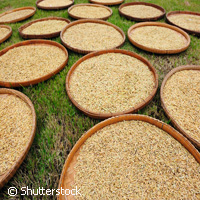Agri research initiative to cut poverty and ease environmental woes
A global scientific partnership for sustainable agriculture has launched a research initiative worth nearly USD 600 million (around EUR 440 million) to help lift people out of poverty and tackle climate change by allowing massive greenhouse gas savings. The Global Rice Science Partnership (GRiSP) says it will achieve these goals via the genetic engineering of rice; the crops can be grown easily in even the poorest countries. The GRiSP believes the initiative will boost supplies enough to reduce estimated rice price hikes by around 6.5% by 2020. Intrinsically linked with food security, rice is a staple food for more than half the global population and in most of the developing world. The GRiSP, an international alliance of researchers led by the International Rice Research Institute (IRRI) and the Consultative Group on International Agricultural Research (CGIAR) - which unites funders and research organisations working on sustainable development - hopes that its efforts to discover new rice genes will help break the crop's yield barrier. It also wants to find ways of breeding new generations of 'climate-ready' rice with flooding tolerance and other traits that are essential for adapting production in the face of climate change. IRRI Director General Dr Robert Zeigler explains that the project has the potential to significantly slash food prices, which he says should lift some 72 million people out of poverty within the next decade. This effect is measured by counting the lower costs as projected income gains worth USD 11 billion (around EUR 8 billion), effectively reducing global poverty by 5% by 2020 and by 11% by 2035. Introducing improved irrigation methods and avoiding deforestation will help prevent the emission of greenhouse gases from rice production by an amount equivalent to more than 1 billion tonnes of carbon dioxide by 2035, according to. Dr Zeigler. It should be noted that more than 1.2 million hectares of forest, wetlands, and other natural ecosystems will be saved because rice production will not need to expand into new areas, thanks to higher rice yields. The initiative will promote 'revolutionary transformations in rice agronomy, processing, and policy', the IRRI says. In addition to increasing yields by using improved seeds and agricultural practices, the project will reduce post-harvest losses which are currently estimated at 20%-30% of developing country production. Likewise, it will offer hundreds of developing country professionals - 'at least 30% of them women' - the opportunity to take part in degree programmes and training courses in an effort to strengthen national research capacities, the institute says. The launch of GRiSP marked the beginning of a five-year endeavour, says the IRRI, adding that new sources of funding would be required to meet this target. 'While GRiSP builds on existing research, development, and funding, it requires additional new financial support to raise annual funding for rice research from around USD 100 million (EUR 73 million) in 2011 to USD 139 million (EUR 102 million) in 2015,' the IRRI says in a statement. 'GRiSP is the opening gambit in a wider campaign to secure the world's food supply within 25 years,' stresses Carlos Pérez del Castillo, Chair of the Board of the Consortium of International Agricultural Research Centers, which was formed during a recent reorganisation of CGIAR and is responsible for providing financial support for CGIAR Research Programs (CRPs). 'In the coming months the CGIAR will launch further high-quality international research programmes that form part of a comprehensive vision, with clear impact-oriented targets for reduction in poverty and hunger, improvements in health and nutrition, and enhanced resilience of the world's ecosystems,' Mr del Castillo concludes.
Countries
France, Japan



